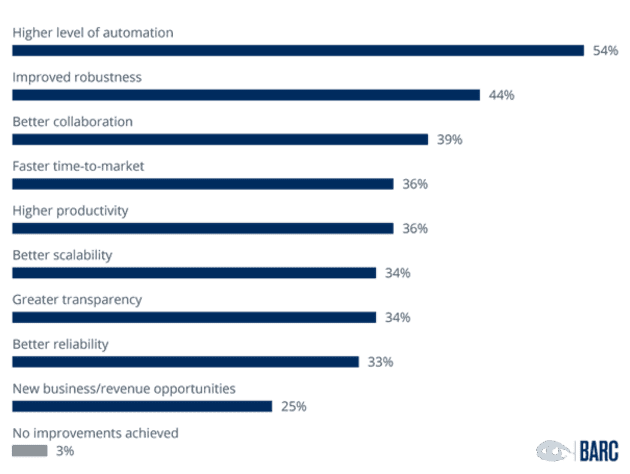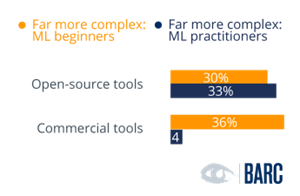DataOps and MLOps Can Help to Overcome Almost All ML Challenges and Problems
BARC (Business Application Research Center) releases the results of its new topical survey “Driving Innovation with AI. Getting Ahead with DataOps and MLOps”. This global survey gives insights into the perception of DataOps and MLOps and related issues. The study is available for download free of charge thanks to sponsorship by ONE LOGIC, Domino Data Lab and DataRobot.
- DataOps and MLOps are widely perceived as relevant concepts for addressing common ML challenges and issues, but only 50 percent of companies already using ML have begun implementing them.
- The concepts live up to their reputation and can provide successful solutions to numerous challenges, help to cope with complexity and enable faster deployments. 97 percent of those who have implemented data/MLOps say they have made significant improvements as a result.
- While open source is dominating the scene, the complexity-reducing and accelerating effect of commercial tools and platforms in the provision of ML results can play an important role for the implementation of Data/MLOps.
- The adoption of DataOps and MLOps is also having a positive impact on the success of other measures such as hiring experts and using new tools, platforms and infrastructure. However, there are still unresolved challenges, most notably access to data and overall acceptance of ML solutions in the broader enterprise context.
What benefits can you expect from Data/MLOps?
According to the results of BARC’s new survey, most companies have only just started their ML journey so have not yet deployed an ML model. Nevertheless, most respondents have already familiarized themselves with the concepts of DataOps and MLOps and are evaluating their implementation. The proportion of those who have already at least partly adopted DataOps and MLOps is surprisingly low at 26 percent. Of the ML practitioners surveyed who have deployed at least one ML model, half have already adopted DataOps and MLOps to some degree and 97 percent of those said they have achieved significant improvements by doing so.

© BARC
“This is no surprise as DataOps focuses on the realization of a manageable, maintainable and automated flow of quality-assured data to data products whose success depends on being up to date,” said Alexander Rode, Data & Analytics Analyst at BARC and co-author of the study. “MLOps addresses the additional special requirements of the development, deployment and maintenance of ML models which are also data products. The goal of both concepts in this context is to achieve transparency regarding all interdependencies across involved systems along an end-to-end data pipeline and to foster collaboration between experts by making the process of developing, updating and maintaining ML models more agile and efficient.”
The survey also uncovered several other positive effects and comparative advantages that can be attributed to the adoption of DataOps and MLOps.
Software selection also matters
In general, DataOps and MLOps as process-oriented concepts can be implemented with open source and commercial tool stacks alike. Nevertheless, the study results show that users of commercial tools are less likely to experience overwhelming complexity as soon as ML models are deployed. The type of tool used makes little difference in the phase before the first deployment.

© BARC
“In our opinion, this time should be used to experiment with different tools and to evaluate present and future requirements,” said Rode. “We recommend getting familiar with the concepts of DataOps and MLOps as they address most of the challenges and problems of applied AI. The survey results indicate that this is not a bad idea anyway. Just occupying yourself with these concepts seems to have a positive effect on the perception and handling of ML-related work. The adoption of DataOps and MLOps also promotes the faster deployment of ML models.”
About The Survey
Driving Innovation with AI. Getting Ahead with DataOps and MLOps is a BARC market research study that examines the perception and impact of DataOps and MLOps in companies who want to make use of machine learning. It is based on a worldwide survey of 248 companies of various sizes and industries. The authors of the study are BARC Analysts Alexander Rode and Timm Grosser.
